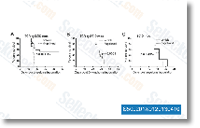This discovering is con sistent with recent reports that vitamin C supplementa tion lowers plasma CRP concentrations, and that dietary intakes of vitamin C and plasma ascorbic acid con centration are inversely related with plasma CRP. Studies are underway to verify the impact of vitamin C supplementation on circulating CRP and also other markers of immune function. Serum ascorbic acid concentration one. 0 mg dL has been suggested as optimal relative to reduced chance of cardiovas cular illness and cancer. By this definition, in excess of 94% of A number of Supp had optimal concentrations, compared to around 47% and 22% in Single Supp and No Supp customers, respectively. Suboptimal concentrations, defined as 0. 4 mg dL, were not observed within the Multi ple Supp user group, and were uncovered in roughly 9% and 32% of Single Supp and No Supp end users, respec tively.
Serum 25 hydroxyvitamin D in A variety of Supp customers is of curiosity simply because of potential beneficial and adverse results from supplemental intake of vitamin D. Enhancing 25 hydroxyvitamin D concentrations above the degree associ ated with subclinical deficiency may possibly greatly reduce the danger of skeletal fractures. Also, MAPK activity parathy roid hormone concentrations come to be minimum when 25 hydroxyvitamin D concentrations exceed a hundred nmol L. Conversely, serum concentrations 600 nmol L are asso ciated with hypercalcemia. Among Multiple Supp customers, no persons had serum 25 hydroxyvitamin D concentrations 37. five nmol L or 600 nmol L, and the mean was 131. 4 MK-2048 nmol L that has a array of 39. 30 to 263. 80 nmol L. No comparative information were avail ready from NHANES participants.
Supplement use was also linked with reduce serum triglycerides and larger HDL cholesterol concentrations. In consequence, the threat of an elevated ratio of complete cho lesterol to  HDL cholesterol was drastically reduce within the Several Supp group in contrast to the No Supp group. Prevalent use of fish oil supplements while in the Many Supp customers could possibly explain these findings as omega 3 fatty acids in fish oil are shown to boost HDL cholesterol and lessen triglyceride concentrations. Though beyond the scope of your existing research, reduced danger of cardiac arrhythmias may be a different benefit of con sumption of omega 3 fatty acids. Self assessed overall health status is identified to become a remark ably really good marker of prospective overall health outcomes. Compared to No Supp end users, Various Supp users had been more more likely to describe their health and fitness as very good or excel lent, whereas this was not the case with Single Supp consumers. Risk of elevated systolic or diastolic blood strain was significantly reduced inside the A variety of Supp group compared to No Supp consumers, but not in Single Supp users compared to No Supp customers.
HDL cholesterol was drastically reduce within the Several Supp group in contrast to the No Supp group. Prevalent use of fish oil supplements while in the Many Supp customers could possibly explain these findings as omega 3 fatty acids in fish oil are shown to boost HDL cholesterol and lessen triglyceride concentrations. Though beyond the scope of your existing research, reduced danger of cardiac arrhythmias may be a different benefit of con sumption of omega 3 fatty acids. Self assessed overall health status is identified to become a remark ably really good marker of prospective overall health outcomes. Compared to No Supp end users, Various Supp users had been more more likely to describe their health and fitness as very good or excel lent, whereas this was not the case with Single Supp consumers. Risk of elevated systolic or diastolic blood strain was significantly reduced inside the A variety of Supp group compared to No Supp consumers, but not in Single Supp users compared to No Supp customers.
FAK signal
FAK is activated by focal adhesion complex
